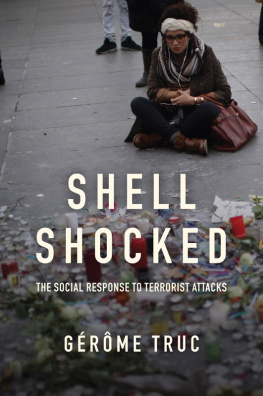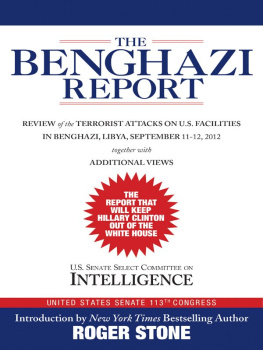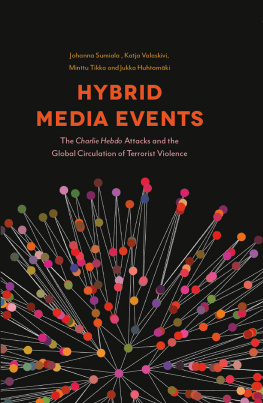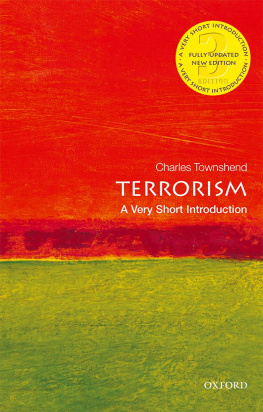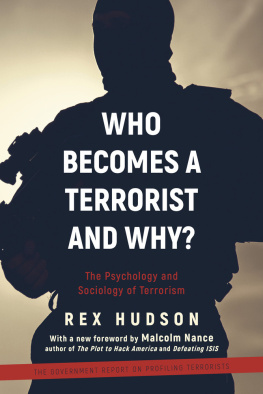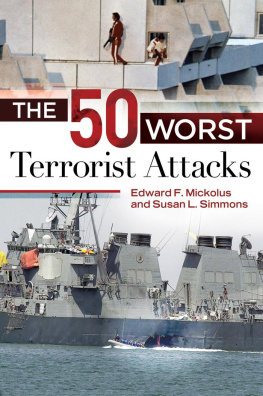
Dedication
For Adlade
and Louis
Copyright page
First published in French as Sidrations. Une sociologie des attentats Presses Universitaires de France, 2016
This English edition Polity Press, 2018
The translation of this work was supported by funding from the REAT Research Project, granted by the Attentats-Recherche committee of the Centre national de la recherche scientifique (CNRS).
Polity Press
65 Bridge Street
Cambridge CB2 1UR, UK
Polity Press
101 Station Landing
Suite 300,
Medford, MA 02155, USA
All rights reserved. Except for the quotation of short passages for the purpose of criticism and review, no part of this publication may be reproduced, stored in a retrieval system or transmitted, in any form or by any means, electronic, mechanical, photocopying, recording or otherwise, without the prior permission of the publisher.
ISBN-13: 978-1-5095-2033-6
ISBN-13: 978-1-5095-2034-3 (pb)
Library of Congress Cataloging-in-Publication Data
Names: Truc, Grme, author.
Title: Shell shocked : the social response to terrorist attacks / Grme Truc.
Other titles: Sidrations. English
Description: Malden, MA : Polity Press, [2017] | Includes bibliographical references and index.
Identifiers: LCCN 2017019475 (print) | LCCN 2017025984 (ebook) | ISBN 9781509520367 (Mobi) | ISBN 9781509520374 (Epub) | ISBN 9781509520336 (hardback) | ISBN 9781509520343 (pbk.)
Subjects: LCSH: TerrorismPsychological aspects. | TerrorismSocial aspects. | Toleration. | Cultural pluralism.
Classification: LCC HV6431 (ebook) | LCC HV6431 .T78513 2017 (print) | DDC 363.32501/9dc23
LC record available at https://lccn.loc.gov/2017019475
A catalogue record for this book is available from the British Library.
Typeset in 10 on 11.5 pt Sabon
by Toppan Best-set Premedia Limited
Printed and bound in the UK by Clays Ltd, St Ives PLC
The publisher has used its best endeavours to ensure that the URLs for external websites referred to in this book are correct and active at the time of going to press. However, the publisher has no responsibility for the websites and can make no guarantee that a site will remain live or that the content is or will remain appropriate.
Every effort has been made to trace all copyright holders, but if any have been inadvertently overlooked the publisher will be pleased to include any necessary credits in any subsequent reprint or edition.
For further information on Polity, visit our website:
politybooks.com
Preface to the English edition
Perhaps, following a recent terrorist attack, you have taken to Facebook or Twitter to express your feelings and your support for the victims; perhaps you have even gone to the places where the terrorists struck in order to reflect, because you lived next door or were passing through the city, and then perhaps you left a short message, a candle or a bouquet of flowers; perhaps you also went out onto the streets to take part in a demonstration in homage to the victims, or to observe a minute's silence. Or perhaps you behaved in quite the opposite way: perhaps you felt that everyone was overdoing it; perhaps you waxed indignant at what you thought were inappropriate reactions; perhaps you found the litany of I am statements on social networks (I am Charlie and so on) depressingly conformist, and remarked that we do not do as much for those who die every day in Syria or trying to reach Europe via the Mediterranean. It is probable, moreover, that you have successively adopted both of these positions in reaction to two different attacks; and that the people around you friends, relatives, colleagues reacted differently. Perhaps you tried to argue with some of them; you may perhaps have discovered that you did not share the same view of things, that the very definitions of these attacks and their causes were not as obvious to others as to you; and, as a result, perhaps you discovered how difficult it was to talk about it.
The reason is that terrorist attacks are not conducive to balanced discussions or to a sense of perspective. They are moments of social effervescence, of surging emotions, in which people get worked up and their positions harden. Each of us reacts to them immediately and viscerally, and we often cannot admit let alone understand that others, even more in our own circles, do not share our feelings. We lack the tools to grasp fully what is at stake, to understand what happens to us collectively and individually at such moments. The social sciences are generally dismissed as useless in such circumstances, since this is no longer a time for scholarly quibbles but one for taking moral and political positions. With or against terrorists: you just have to choose your side, and that's that. Comments are then reduced to generalities, in which we mix reflections on what we are and what we should be, about the trauma suffered by the social body as a whole and the resilience it is supposed to show; meanwhile, cultural conversations created in the wake of terrorist attacks and that, for lack of perspective, we will gradually be drowned in it.
This risk is especially great since such attacks happen again and again. I am writing these lines a few hours after the Manchester Arena bombing, just over a month and a half after the attacks in Stockholm and two months after the attack in Westminster, while the Berlin attack is barely six months old and the first anniversaries of the attacks in Nice and Orlando have not yet arrived. More than ever, therefore, we need a sociology of terrorist attacks to understand the effects of this type of attack on our societies better, and to help us to face them: this is what this book proposes.
At its heart is an inquiry conducted over several years into the reactions to the 9/11 attacks and those on Madrid in 2004 and London in 2005, from which I review a whole series of questions that arose in France following the attacks on Charlie Hebdo and the Hypercacher in January 2015. The manuscript was completed one month to the day before the attacks of 13 November 2015. Despite the scale of that later attack which meant that some French journalists regretted having hastily described the attack on Charlie Hebdo as a French 9/11 I did not consider it advisable to postpone the publication of this book. This was because, irrespective of the train of events, the sociological mechanisms that my investigation have laid bare remain fundamentally the same. It is precisely in this respect that sociological analysis offers a valuable perspective which makes it possible to look at the news differently just as the news sometimes makes it possible to perceive the usefulness of this analysis better.
It will undoubtedly be better understood today, at a time when European societies are being subjected to an unprecedented series of suicide bombings, why it was necessary to begin this work with two chapters which scrutinize how the attacks of 9/11 were experienced on either side of the Atlantic and the role played by the analogy with this event in the perception of subsequent attacks in Europe, as elsewhere across the world. Although 9/11 took place over fifteen years ago, it marked a fundamental shift not only in the modalities of terrorism but also in the relationship of Western societies to terrorist acts, so that we cannot understand the way those societies now react to these acts without taking that initial event into account.
Next page
